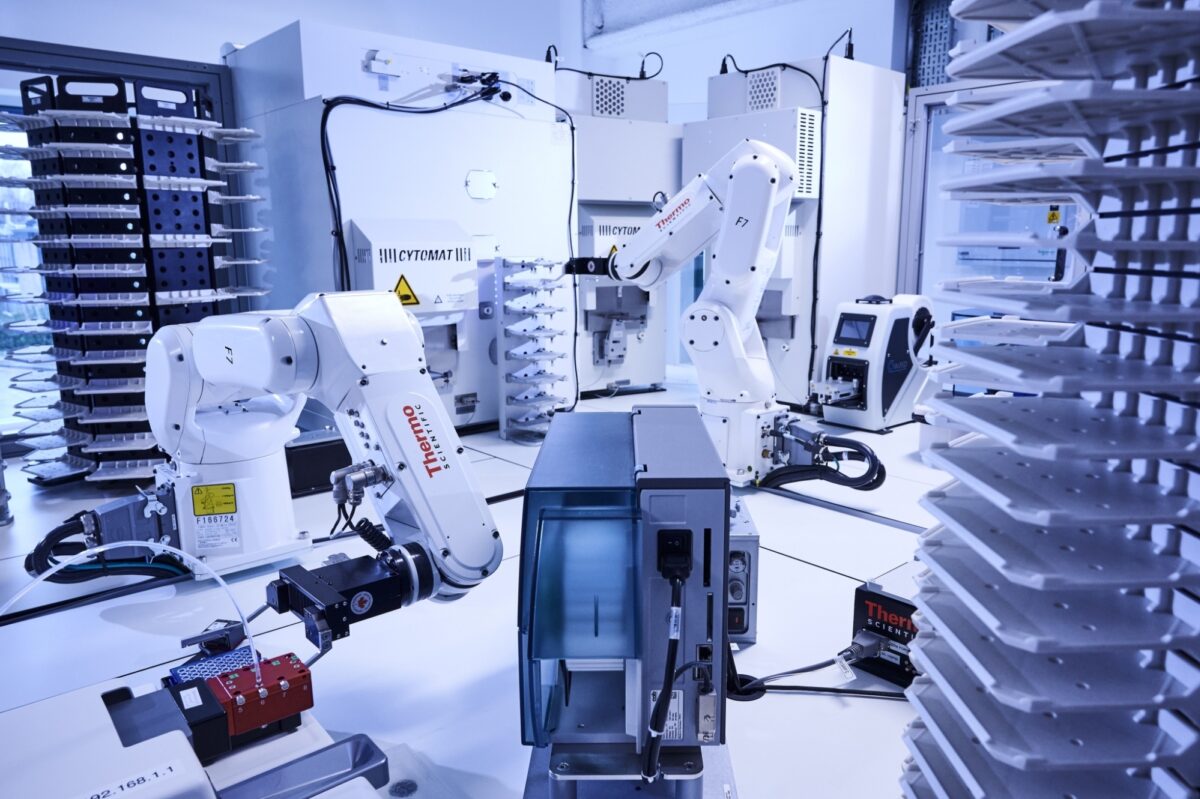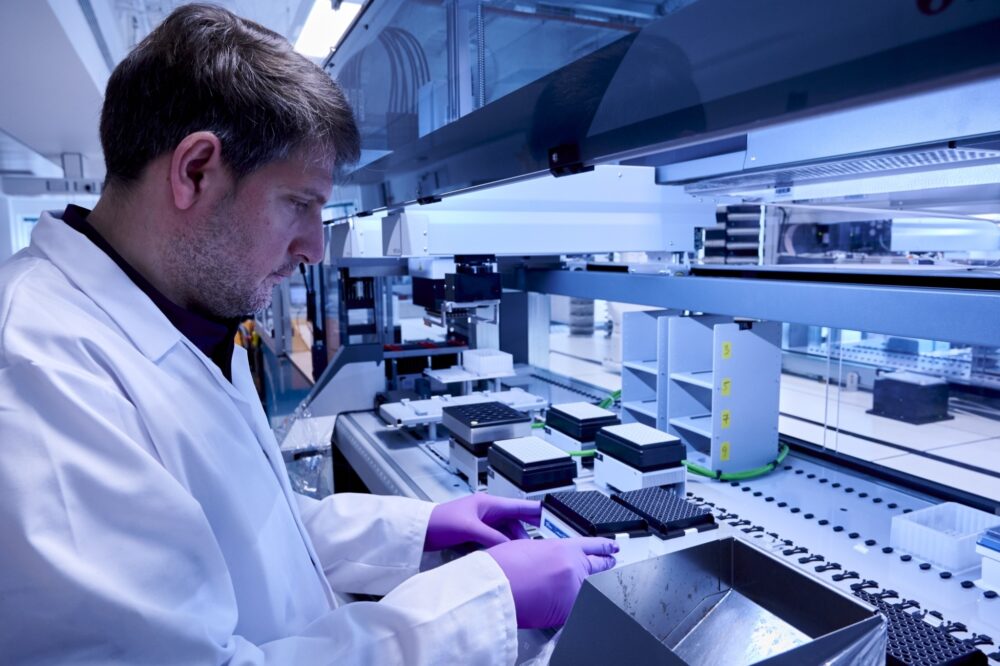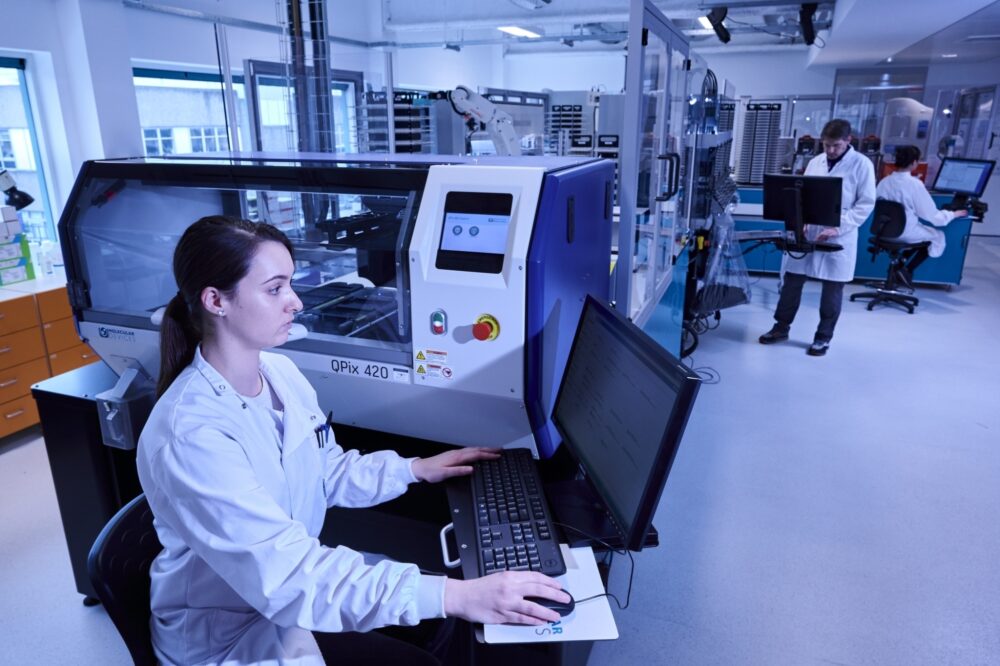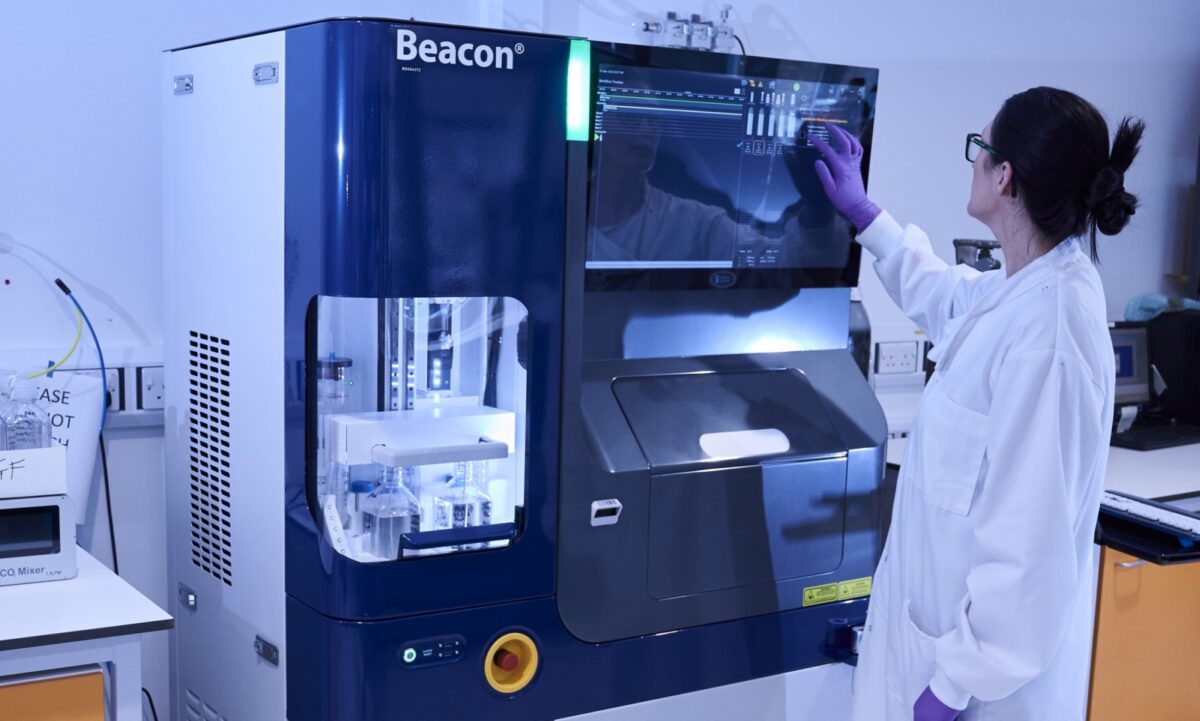

CyanoSource: a barcoded Synechocystis mutant library and plasmid resource
Synechocystis is the most widely studied species of cyanobacteria yet only ~30% of the predicted gene coding sequences have an assigned function. To accelerate the understanding of cyanobacterial biology and assist biotechnological exploitation, CyanoSource, a barcoded Synechocystis mutant library and plasmid resource is being developed by the McCormick (University of Edinburgh) and the Lea-Smith (University of East Anglia) groups in collaboration with two UK Biofoundries: The Edinburgh Genome Foundry (EGF) and Earlham BioFoundry.
The project aims to generate a library of thousands of knock-out mutants by generating plasmids targeted to the predicted gene coding sequences of Synechocystis. The original cloning strategy featured a standard PCR-based approach, where each pair of flanking sequences was amplified from genomic DNA and ligated into a plasmid with the selection marker. The PCR approach was economically attractive due to its low cost but did not prove efficient enough for high-throughput, miniaturised cloning methods. Therefore, the project design was modified by the EGF team.
The CyanoSource project has only been possible because of the high-throughput automated facilities available at the Edinburgh Genome Foundry, and in particular, the efforts of the Foundry’s team, who have been highly engaged to help overcome challenges throughout the project.
– Dr Alistair McCormick, Reader in Plant Molecular Physiology and Synthetic Biology.
EGF’s optimised design uses synthetic DNA instead of PCR products and optimised end-joining DNA sequences (overhangs), designed and selected by the EGF team, for the cloning. Furthermore, DNA sequence barcodes have also been generated programmatically to “watermark” the generated DNA sequences. EGF proceeded to maximise the use of their automated DNA assembly and sequencing pipeline to generate the library.

The work included the development of an automated lab protocol to create a high through-put, miniaturised, one-pot digestion-ligation reaction for plasmid assembly where an acoustic dispenser was utilised to combine the required barcoded gene fragment, acceptor vector, and selection marker donor plasmid components for each plasmid. Plasmids were then transformed and propagated in E. coli using an automated end-to-end process involving a liquid handling robot and automated colony picker before high-throughput screening of the purified plasmids was performed by colony PCR using 96-well E-gel electrophoresis. Positive clones were further validated by whole-plasmid sequencing.
The automated protocol was further supported by EGF through the development of both a project-specific, generic software and a software package “Dioscuri”. The project-specific custom script assists in the simulation of the assembly, generation of resultant plasmid sequence files, and creation of and validation of the robotic instruction files both for the PCR reaction and for the assembly whilst the Dioscuri software package manipulates (read/write) pipetting instruction files for the Tecan automated liquid handling robot used in the assembly. This package is used by a script that creates robotic instruction files specifically for the transfers.
Working with the McCormick group, EGF also developed a semi-automated protocol for high-throughput transformation of Synechocystis knock-out mutants. The protocol uses a liquid handling robot to combine verified plasmids with Synechocystis cultures and progress these through to the generation of frozen mutant DMSO stocks.
The growing library of individual mutants and plasmids will soon be publicly available to the research and biotechnology communities. Furthermore, the techniques and protocols developed at EGF can be employed to develop mutant libraries for other genetically amenable cyanobacteria. It is anticipated that CyanoSource will accelerate our capacity to study functional genomics and cellular processes in cyanobacteria and improve knowledge transfer between research institutions and industries interested in cyanobacterial biotechnology.

Specialisms
Technologies available
The Edinburgh Genome Foundry is a research facility specialising in the high-throughput modular assembly of DNA constructs using a highly automated, species agnostic, robotic platform. We build genetic constructs for academic and industrial customers to equip cells or whole organisms with new or improved functions. We work on projects as diverse as programming stem cells for use in personalised medicine, vaccine development, gene therapy and living biosensors for basic biological research.
With its unique expertise and technology platforms, the Foundry can help you accelerate your research today. Our facility has supported a diverse range of academic and commercial projects. Contact us to talk through your ideas.
Services available
DNA Assembly
Automated Molecular Biology Protocols
More details
Contact us to explore how the EGF team can help accelerate your research and development needs today.
Dr Rennos Fragkoudis, Head of EGF.
r.fragkoudis@ed.ac.uk
Find out more about EGF's Beacon® system, currently the only such instrument in an academic setting in Europe

We will provide support and funding to help you deliver your project. Our Business Interaction Vouchers support industry-academic collaborations with up to £25,000 per project (conditions apply).
Contact Dr Emma Elliott to start working together with our experts.

Discover the University of Edinburgh's expert Genotype to Phenotype facilities. Our technical experts will help your team make new discoveries and translational developments from genotype to phenotype. Our specialist support will guide you through the journey every step of the way.